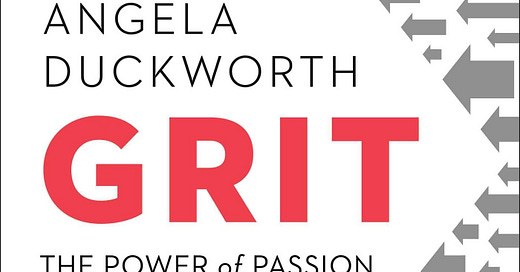GRIT is a powerful read. In one of the chapters, the author Angela Duckworth double clicks on one of Will Smith’s interviews where he mentions, “The only thing that I see that’s distinctly different about me is, I’m not afraid to die on a treadmill. You might be more talented. You might be smarter. But if we get on that treadmill together, one of two things is happening: you’re getting off first, or I’m going to die.” This hit a home run for me. In this blog, let me talk about this popular yet insightful bestseller.
If talent is the golden boy, grit is the janitor who stays late. You don’t notice him until the toilets don’t flush and everything smells like failure. That’s what this book is about. It’s not about being a genius. It’s about staying in the room long after everyone smarter than you has gone home.
Angela Duckworth, a psychologist who once taught seventh grade math, looked around and noticed something. The kids who succeeded weren’t always the ones with the highest IQ. They were the ones who didn’t quit. The ones who showed up. The ones who studied words no one has spoken out loud since the Roman Empire, just to win a spelling bee no one remembers.
She called it grit.
What Grit Is
Grit is passion + perseverance. Not short bursts of fire, but slow burn. Grit is what you have when you’re still working long after the novelty wore off and the snacks ran out. It’s staying loyal to your goal when your goal is being mean to you.
People think success is talent. Duckworth disagrees. She has a formula":
Talent gets you to skill. Skill, with more effort, gets you to achievement.
Which means effort counts twice. It’s the compound interest of success. One kid learns fast, another kid works hard. Guess who wins in the end? Usually the one who doesn’t '“stop”.
Can you build it?
Duckworth says grit isn’t born, it’s built. There are four parts.
First, interest. You have to like what you’re doing, at least at the start. It doesn’t have to be romantic. Curiosity will do. Most people fall in love with something slowly. That’s fine. Just don’t fake it, because grit needs fuel.
Second, practice. Not the kind where you repeat the same thing like a trained parrot. Deliberate practice. The painful kind. The super boring kind. Stretching, failing, adjusting, repeating. Iterating. I am a product manager by profession, design and iterate is in our DNA which helps us build world class products.
Third, purpose. Eventually, passion grows up. It stops asking what you want and starts asking what the world needs. People with grit often believe their work matters to someone else. A nurse. A teacher. A piano tuner for a blind orchestra.
Fourth, hope. Not the kind on bumper stickers or on the titles on popular generic self help books. Real hope. The belief that you can improve, even after falling on your face. The kind of hope that keeps you going after everyone’s stopped clapping.
Where It Comes From
Grit isn’t just inside you. It’s also around you. Parents matter. Teachers matter. Coaches matter. Duckworth says the magic formula is love plus high standards. Warmth with backbone. Encouragement with expectations. The grown-ups who say “I believe in you, now get back out there.”
Culture matters too. Join a team that thinks quitting is for amateurs, and you’ll start to believe it. Hang around people who keep hammering away at the same problem, and you might pick up a hammer too.
So What?
The truth is, talent is overrated. Grit is what gets things done. It’s slow. It’s not glamorous. But it works. Most people give up too early. Gritty people don’t. They finish. That’s the whole game. They are comfortable with things being boring.
So if you’re not the smartest, fastest, strongest, good. Now you don’t have to carry the burden of early success. Just pick something, and keep going. Keep going when it’s dull. Keep going when it’s hard. Keep going when you want to throw it out the window. That’s grit.
And that’s the whole story. That I feel sums up the book pretty much. Thanks for reading!




![Grit: The Power of Passion and Perseverance [Book] Grit: The Power of Passion and Perseverance [Book]](https://substackcdn.com/image/fetch/w_1456,c_limit,f_auto,q_auto:good,fl_progressive:steep/https%3A%2F%2Fsubstack-post-media.s3.amazonaws.com%2Fpublic%2Fimages%2Fda40364e-268f-411d-9678-b8d4b9c07dbf_1400x2113.jpeg)
Adbhoot read, Avdhoot.
Thanks man!